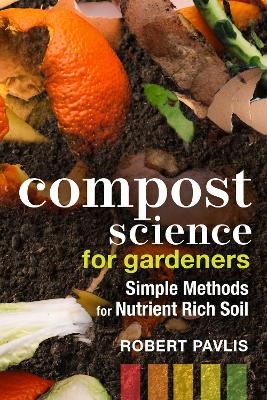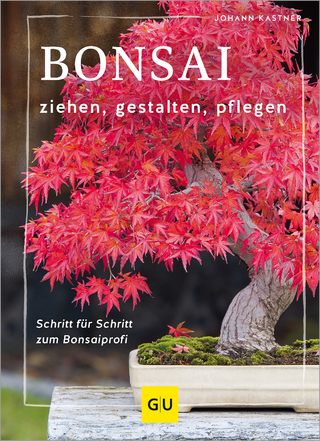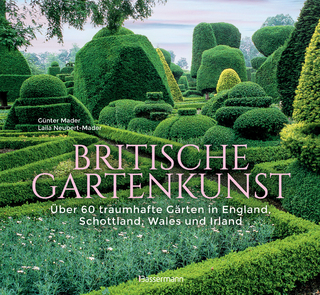
Compost Science for Gardeners
New Society Publishers (Verlag)
978-0-86571-976-7 (ISBN)
- Titel z.Zt. nicht lieferbar
- Portofrei ab CHF 40
- Auch auf Rechnung
- Artikel merken
Create your own compost and grow better plants.
With breathtaking clarity, Compost Science for Gardeners demystifies composting practices and helps readers determine the best technique for their unique situation. This comprehensive science-based book is your key to building healthier soil and growing better plants.
Using plain language and easy-to-follow instructions, this essential resource distills and blends the latest scientific research with the author's many decades of knowledge and experience into manageable form, debunking a host of common gardening myths along the way. Learn about:
The role of composting in the ecological cycle
Compostable materials to incorporate and those to avoid
Browns and greens vs the carbon-to-nitrogen ratio
The full range of composting methods, including cold and hot composting; composting in piles, bins, and tumblers; and pit and trench composting
Keyhole gardening, food digesters, vermicomposting, bokashi, eco-enzyme fermentation, and more
The relative merits and impact on the environment of each composting technique
Using finished compost to improve soil health
Anyone can compost. Whether you are a balcony or backyard gardener, market gardener, small-scale farmer, or homesteader, or even if you are simply looking for a way to keep organic matter out of the landfill, this book will show you how to do it simply, safely, and sensibly.
Robert Pavlis is a Master Gardener with over 45 years' experience in the art and science of horticulture, with a particular focus on soil chemistry and health. He is the owner and developer of Aspen Grove Gardens, a 6-acre botanical garden featuring 3,000 varieties of plants. A sought-after speaker, and lecturer, Robert has published many articles in magazines such as Mother Earth News and Ontario Gardening. He maintains two widely read blogs – gardenfundamentals.com and gardenmyths.com – and a popular YouTube channel with nearly 50,000 subscribers. Robert is the author of Plant Science for Gardeners, Soil Science for Gardeners and Building Natural Ponds. He resides in Guelph, Canada.
1. Introduction
What Is Compost?
Why Should Everyone Compost
Myths About Composting
Definitions
2. The Role of Compost in Soil
Benefits of Composting
The Microorganism Myth
What Is Soil Health?
What Is Soil?
Plant Nutrients
Tilling
Mulching
3. The Science of Composting
The Reality of Composting
The Hot Composting Process
Understanding Microbes
The Role of Macroorganisms
What Role Do Worms Play?
Heat Kills Pathogens
Heat Kills Weed Seeds
How Long Does It Take?
The Carbon to Nitrogen Ratio
Cold vs Medium vs Hot
Chemical Properties of Compost
Loss of Plant Nutrients
Humus
When Is Compost Ready?
4. Compostable Material
Good Composting Material
Controversial Composting Material
Bad Composting Material
5. Managing the Composting Process
Location
Storing Input Ingredients
Air
Water
Turning
Shred Input Material
The Curing Stage
Using Activators
Nitrogen Sources
Winter Time
Two Is Better than One
Speeding Up the Process
Keep Animals Out
Keep Out Insects
Troubleshooting
Selecting the Right Composting System
6. Piles, Bins, and Tumblers
Simple Piles
Bins and Boxes
Wire Cage
Plastic Garden Composter
Tumblers and Rotating Drums (Barrels)
Food Waste Digester
Windrow Composting
Sheet Composting
7. Easy Composting
Cut and Drop Method
Leaf Mold
Pit and Trench Composting
Keyhole Composting
Electric Composters (Food Digesters)
8. Vermicomposting
Understanding Worms
What Is Vermicompost?
Selecting the Right Worms
Worm Bins
Worm Food
Bedding Material
Caring for Your Pets
Troubleshooting
Harvest Castings
Using Vermicompost
Vermicompost Tea
Is Vermicompost Special?
9. Bokashi Composting
The Fermentation Process
Fermentation vs Composting
The Bokashi Method
The Power of Effective Microbes (EM)
Brew Your Own EM Microbes
Making Bokashi Bran
Using Bokashi Leachate (Tea)
Using Bokashi Ferment
Soil Factory Using Bokashi Ferment
Pros and Cons of Bokashi
10. Eco-enzyme (Garbage Enzymes)
What is Eco-enzyme?
Making Eco-enzyme
Using Eco-enzyme Tea
Using Eco-enzyme Ferment
11. Buying Compost
Municipal Compost
Biosolids (Sewage Sludge)
Mushroom Compost
12. Compost Tea
Types of Compost
Claimed Benefits of Compost Tea
What Does the Science Say
13. Selecting the Best Composting Method
Environmental Concerns
Mixing Composting Methods
14. Using Compost
When Is Compost Finished?
Should You Sift Compost?
Mulching vs Burying
Beware of High Carbon Compost
Is Compost Safe for Vegetables?
Amending Potting Soil
Can You Use Too Much Compost?
Storing Compost
When Is the Best Time to Use Compost?
Can Compost Make You Sick?
Epilogue: Beware of Garden Myths
Endnotes
Index
About the Author
Also by the Author
About New Society Publishers
| Erscheinungsdatum | 30.01.2023 |
|---|---|
| Reihe/Serie | Garden Science Series |
| Zusatzinfo | 25 Illustrations, black and white |
| Verlagsort | Gabriola Island |
| Sprache | englisch |
| Maße | 152 x 229 mm |
| Gewicht | 354 g |
| Themenwelt | Sachbuch/Ratgeber ► Gesundheit / Leben / Psychologie |
| Sachbuch/Ratgeber ► Natur / Technik ► Garten | |
| Naturwissenschaften ► Biologie ► Mikrobiologie / Immunologie | |
| ISBN-10 | 0-86571-976-4 / 0865719764 |
| ISBN-13 | 978-0-86571-976-7 / 9780865719767 |
| Zustand | Neuware |
| Haben Sie eine Frage zum Produkt? |
aus dem Bereich


